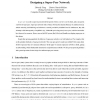Free Online Productivity Tools
i2Speak
i2Symbol
i2OCR
iTex2Img
iWeb2Print
iWeb2Shot
i2Type
iPdf2Split
iPdf2Merge
i2Bopomofo
i2Arabic
i2Style
i2Image
i2PDF
iLatex2Rtf
Sci2ools
ICDE
2003
IEEE
2003
IEEE
Designing a Super-Peer Network
A super-peer is a node in a peer-to-peer network that operates both as a server to a set of clients, and as an equal in a network of super-peers. Super-peer networks strike a balance between the inherent efficiency of centralized search, and the autonomy, load balancing and robustness to attacks provided by distributed search. Furthermore, they take advantage of the heterogeneity of capabilities (e.g., bandwidth, processing power) across peers, which recent studies have shown to be enormous. Hence, new and old P2P systems like KaZaA and Gnutella are adopting super-peers in their design. Despite their growing popularity, the behavior of super-peer networks is not well understood. For example, what are the potential drawbacks of super-peer networks? How can super-peers be made more reliable? How many clients should a super-peer take on to maximize efficiency? In this paper we examine super-peer networks in detail, gaining an understanding of their fundamental characteristics and perform...
Related Content
| Added | 01 Nov 2009 |
| Updated | 01 Nov 2009 |
| Type | Conference |
| Year | 2003 |
| Where | ICDE |
| Authors | Beverly Yang, Hector Garcia-Molina |
Comments (0)

